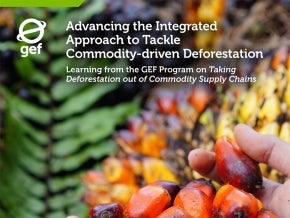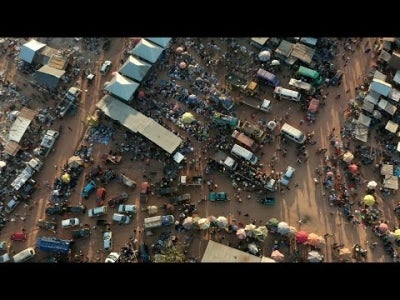PRESS RELEASE

March 18, 2011, Rome - By 2025, 1.8 billion people will be living in regions with absolute water scarcity and two-thirds of the world's population may experience water-stress conditions.
Forests capture and store water and can play an important role in providing drinking water for millions of people in the world's mega-cities. Given this fact, the members of the Collaborative Partnership on Forests (CPF), international organizations involved in forests, call upon countries to pay more attention to forest protection and management for the provision of clean water
"Forests are part of the natural infrastructure of any country and are essential to the water cycle", said Eduardo Rojas-Briales, Assistant Director General of the FAO Forestry Department.
"They reduce the effects of floods, prevent soil erosion, regulate the water table and assure a high quality water supply for people, industry and agriculture." He was speaking prior to the UN World Water Day which will be celebrated this year on 22 March.
Forests are in most cases an optimal land cover for catchments supplying drinking water. Forest watersheds supply a high proportion of water for domestic, agricultural, industrial and ecological needs.
"The management of water and forests are closely linked and require innovative policy solutions which take into account the cross-cutting nature of these vital resources", said Jan McAlpine, Director of the United Nations Forum on Forests Secretariat. "The International Year of Forests, 2011 provides a unique platform to raise awareness of issues such as the water-soil-forests nexus, which directly affect the quality of people's lives, their livelihoods and their food security."
Moreover, forests and trees contribute to the reduction of water-related risks such as landslides, local floods and droughts and help prevent desertification and salinization.
Today, at least one third of the world's biggest cities, such as New York, Singapore, Jakarta, Rio de Janeiro, Bogotá, Madrid and Cape Town draw a significant portion of their drinking-water from forested areas. If properly utilized, forest catchment areas can provide at least a partial solution for municipalities needing more or cleaner water.
Generating momentum on forests and water
It is well known that water used by forests can be influenced and reduced by prudent forest planning and management practices such as the planting of appropriate tree species. Countries are stepping up policy and project activities to increase forest areas for the protection of soil and water.
Eight percent of the world's forests have soil and water conservation as their primary objective. While every hectare of forests make a huge contribution to regulating water cycles, around 330 million hectares of the world's forests are designated for soil and water conservation, avalanche control, sand dune stabilization, desertification control or coastal protection. This area increased by 59 million hectares between 1990 and 2010. The recent increase is largely due to large-scale planting in China for protective purposes.
Topics related to forest and water interactions have gained international attention in recent years. Many relevant conferences and events have been organized between 2008 and 2010, each of them looking at forests and water issues from a different perspectives (e.g. integrated water catchment area management and the role of forests in precipitation). Based on the outcomes of these meetings, a set of practical actions on forests and water supply are currently being developed for policy-makers and technicians.
Work is also continuing at the project level, particularly in transboundary water courses. One very prominent example is the "Fouta Djallon Highlands (FDH) Integrated Natural Resources Management Project" in West Africa.
This ten-year project, supported by the Global Environment Facility and jointly implemented by FAO, UNEP and the African Union, involves eight countries (Gambia, Guinea, Guinea Bissau, Mali, Mauritania, Niger, Senegal, and Sierra Leone).
The Fouta Djallon Highlands are the point of origin of a number of international water courses, notably the Gambia, Niger and Senegal rivers. Shifting agriculture and tree felling for charcoal production led to heavy deforestation and depleted water resources in the area. In order to improve local livelihoods and water resources, the project aims to ensure the conservation and sustainable management of natural resources through the restoration of forest cover.
...................................................................
Tools for journalists & editors:
Request photos: (+39) 06 570 53082 or photo-library@fao.org
Video material/b-roll: (+39) 06 570 55980 / 53963
Audio material: (+39) 06 570 53223
RSS feed of FAO news releases
Online newsroom: http://www.fao.org/news/newsroom-home/en/
FAO's media office on Twitter
More tools online
Contact: Irina Utkina, Media Relations (Rome), (+39) 06 570 52542, irina.utkina@fao.org


